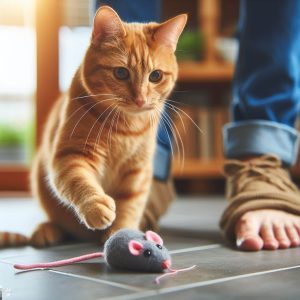Cats are natural-born hunters with strong predatory instincts. As pet owners, we often catch our feline friends bringing home mice and other small animals as “gifts.” This raises the question – do cats eat mice whole or do they chew them up first?
The short answer is – it depends! Cats are capable of swallowing mice whole, but they don’t always do so. Their approach depends on the size and type of prey. Let’s take a deeper look at cat eating habits and how they consume mice.
Why Cats Hunt Mice
Cats are obligate carnivores, meaning they need meat in their diet to survive. Their bodies are adapted for hunting small prey like mice, rats, birds, lizards, and insects. Here’s why cats have a strong urge to hunt:
- Instinct – All cats are born with innate predatory skills and instincts. They don’t need to be taught how to hunt. Even domestic cats who are well-fed will still hunt for sport.
- Nutrition – Mouse meat provides protein, fat, vitamins, and minerals that cats need. Their bodies crave the nutrients found in whole prey.
- Mental Stimulation – Stalking prey satisfies a cat’s need for activity and simulation. It exercises both their body and mind.
- Practice – Catching mice helps cats hone their hunting skills for survival. It’s good practice, even for house cats.
So don’t be surprised when your cat drops a mouse on your doorstep! They are just following their natural instincts.
Do Cats Always Eat What They Catch?
Cats don’t necessarily eat every mouse or other animal they catch. Sometimes they will kill their prey and leave it uneaten. Here are some reasons why:
- They aren’t hungry after making the kill. Cats will hunt even when not motivated by hunger.
- The prey is too large or difficult to eat. Cats may kill out of instinct without intending to eat it.
- They want to gift it to you. Bringing home prey is an offering to you.
- They lost interest after the thrill of the hunt. Stalking is exciting, eating is not.
- To remove competition. Cats will kill mice even if well-fed to remove pests.
So while cats are prolific hunters, they don’t always consume their catches. The act of hunting satisfies them regardless.
Do Cats Eat Mice Whole?
Now let’s address the question you’re probably most interested in – do cats swallow mice whole or chew them up first?
The answer depends on the size and type of rodent:
Small Mice
Cats are able to swallow very small mice whole. A kitten mouse or pinky mouse is tiny enough to gulp down without chewing. This allows cats to quickly consume the nutrients in small prey.
However, most adult mice are too big for a cat to eat whole. The average adult mouse ranges from 3-7 inches long including the tail. An adult mouse would be a choking hazard if swallowed whole.
So full-grown mice need to be broken down into smaller pieces first through chewing.
Large Mice
With adult mice, cats will first kill them by breaking their neck or severing the spinal cord. Once dead, the cat will start chewing the mouse into more manageable chunks.
They often start by consuming the nutrient-rich organs like the liver, heart, and brain. The bones and muscles take more work to chew through. Cats will eat the meatiest parts of large mice.
Baby Rabbits
Rabbits and hares are another common prey for cats. Kittens and juvenile rabbits can sometimes be eaten whole by cats. Their bones are soft, their fur is easy to lick off, and they are small enough to swallow.
However, cats cannot consume an adult rabbit whole. It would simply be too large and hazardous. They must bite and chew it into pieces first.
Rodent Type
The species of rodent also impacts how a cat eats its prey. A mouse generally has thinner bones and skin compared to a vole or rat. Thinner bones crush more easily, allowing cats to eat mice whole more often than other rodents.
The size, age, and type of rodent all factor into a cat’s approach to eating its catch. Kittens and baby mice are swallowed promptly while adults are chewed first.
How Do Cats Eat Mice?
Now let’s look at the step-by-step process of how cats eat mice and other rodents:
1. Kill Bite
Cats dispatch mice quickly with a bite to break the neck or sever the spine. This paralyzes or kills the mouse so it stops moving.
2. Remove Fur
Before eating, cats will lick and nibble off some of the mouse’s fur. The fur can cause choking or hairballs, so removing some of it makes swallowing easier.
3. Consume Organ Meat
Next, cats peel back the skin to access the belly and consume the nutrient-dense organs like the liver, heart, kidneys, and brains. These soft tissues are full of moisture and protein.
4. Tear Meat
Once the organs are eaten, cats will start to tear and bite off chunks of muscle meat. They typically start with the meatiest areas like the haunches and thighs.
5. Crack Bones
To access the bone marrow, cats will bite down on bones to crush them. The marrow provides additional nutrition and fat.
6. Repeated Chewing
For adult mice or rats, cats need to chew repeatedly to break them down and crush the bones. They may gulp down smaller chunks once chewed soft.
7. Lick Bones Clean
As a final step, cats will lick the bones clean to scrape off any remaining bits of tissue or marrow. This helps them extract all the nutrients.
Cats have a systematic approach to dismantling rodents and extracting maximum nutrition. Their method varies slightly based on the size and type of prey.
Why You Shouldn’t Let Cats Eat Mice
While cats are natural hunters of mice, you shouldn’t allow your pet cat to eat wild mice they catch. Here are some health risks:
- Parasites – Mice and rats carry parasites like Toxoplasma, fleas, and ticks which can transmit disease.
- Rodenticides – Wild mice may have consumed rat poison, which could sicken your cat.
- Injuries – Eating live prey poses a biting/scratching hazard. An injured mouse could bite your cat in self-defense.
- Blockages or choking – Eating mice too quickly could potentially obstruct your cat’s airway or digestive tract.
- Food poisoning – Eating mice raw exposes cats to harmful bacteria like Salmonella and E. coli.
For safety, you should discard any “gifts” of mice your cat brings home. Don’t allow free-roaming outdoor cats to hunt and eat wild rodents. Keeping your cat well-fed on commercial cat food can help curb the urge to hunt. Speak to your vet about safe, healthy alternatives to satisfy your cat’s predatory drive.
Signs Your Cat Ate a Mouse
How can you tell if your sneaky kitty has been hunting and eating mice? Here are some clues:
- Missing mice from traps around your home
- Finding only mouse body parts or bones
- Strong mouse/rodent smell on your cat’s breath
- Vomiting or coughing up fur, bones, tails, or feet
- Scratches or wounds on your cat’s face or paws
- Tapeworm segments in your cat’s feces (mice can transmit tapeworms)
- Lethargy, vomiting, or diarrhea after eating (signs of toxicity or blockage)
Keep an eye out for these signs after your indoor/outdoor cat returns from an outdoor adventure. Seek prompt veterinary care if you suspect your cat ate a mouse and is showing any symptoms of illness.
FAQs About Cats Eating Mice
Here are answers to some frequently asked questions:
Can cats eat mice tails?
Yes, cat can and will eat the tail of mice. The tail bones are small, easily crushed, and a good source of fat and cartilage.
Do cats eat mice poop?
Not typically. Cats mainly go for the nutrient-rich organs and muscles. Eating feces would introduce intestinal parasites.
Why does my cat eat only the mouse’s head?
The head contains the brain, fatty cheek/jowl meat, and crunchy skull bones – all appealing parts to cats.
Are mice dangerous for cats?
Yes, mice can transmit parasites and diseases. Eating wild mice raw can make cats very sick.
Do cats get full after eating a mouse?
An average mouse won’t fill up a cat. But a very large mouse or rat could potentially serve as a full meal.
Will cats eat rabbits?
Yes, cats are able to hunt and eat small to medium-sized rabbits, particularly juvenile ones. The bones are soft enough for cats to crush.
Hopefully this article gave you a better understanding of your cat’s mouse-hunting and eating behaviors. While interesting, allowing cats to consume wild rodents can be extremely hazardous. Be sure to safeguard your pet’s health by keeping them well-fed and away from pests. Consult your veterinarian for more advice on managing your cat’s predatory instincts.



